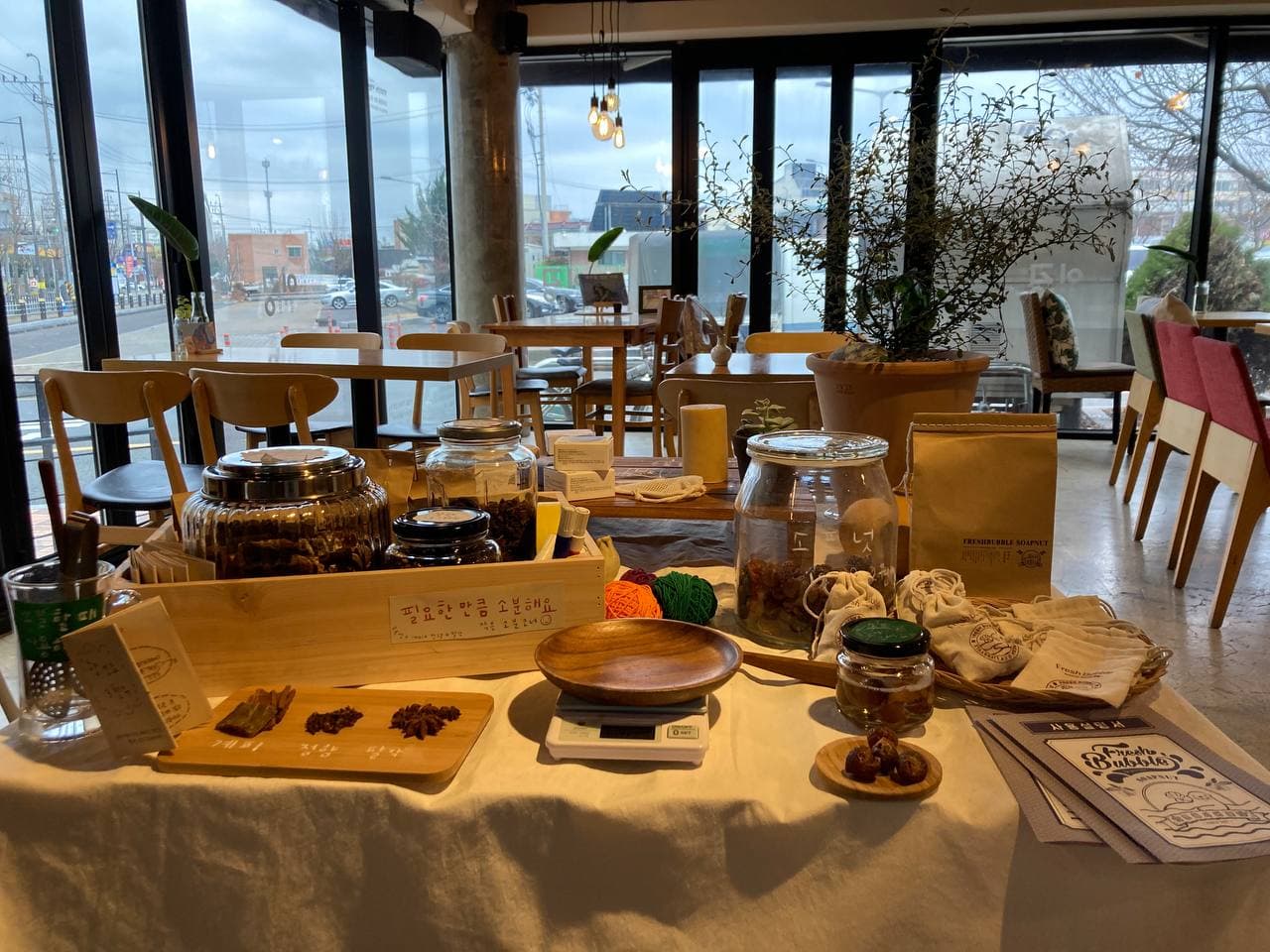Zero Waste, a Way of Life
By Melline Galani.
Fact: In 1950, 1.5 million tons of plastic were produced. Now we are producing over 380 million tons of plastic every year, and some reports indicate that up to 50 percent of that is for single-use purposes. What is more, it is estimated that more than ten million tons of plastic are dumped into our oceans every year.
Can we live without producing waste? Maybe not, but we definitely can reduce it. The ultimate goal is to stop waste from going to a landfill or to the incinerator, because, inevitably, all the toxic substances end up in the air, soil, and water and destroy our planet little by little every day.
The Gwangju News recently heard about the zero-waste initiative in Gwangju and met with one of the representatives, Lee Sehyoung (이세형), to discuss the topic.
Gwangju News (GN): Thank you for taking time to do this interview. First, would you please introduce yourself to our readers?
Lee Sehyoung: I am Sehyoung Lee, the director of Igong Space (이로운공간 이공). In 2016, Igong was established for the local young adults to provide an opportunity and place to work, live together, and get along in their community; the goal was to make a cooperative establishment, including a workplace, a living area, and a playground. Various events for young people have been held based on this concept in the past three years. Igong was opened as a community café from 2017, and from last October to December it had collaborated with Your Step, an operating zero-waste pop-up store called 한걸음 가게 – One step store. This is how I decided to create a zero-waste store within the café place. So technically, the café has expanded its field to zero-waste.
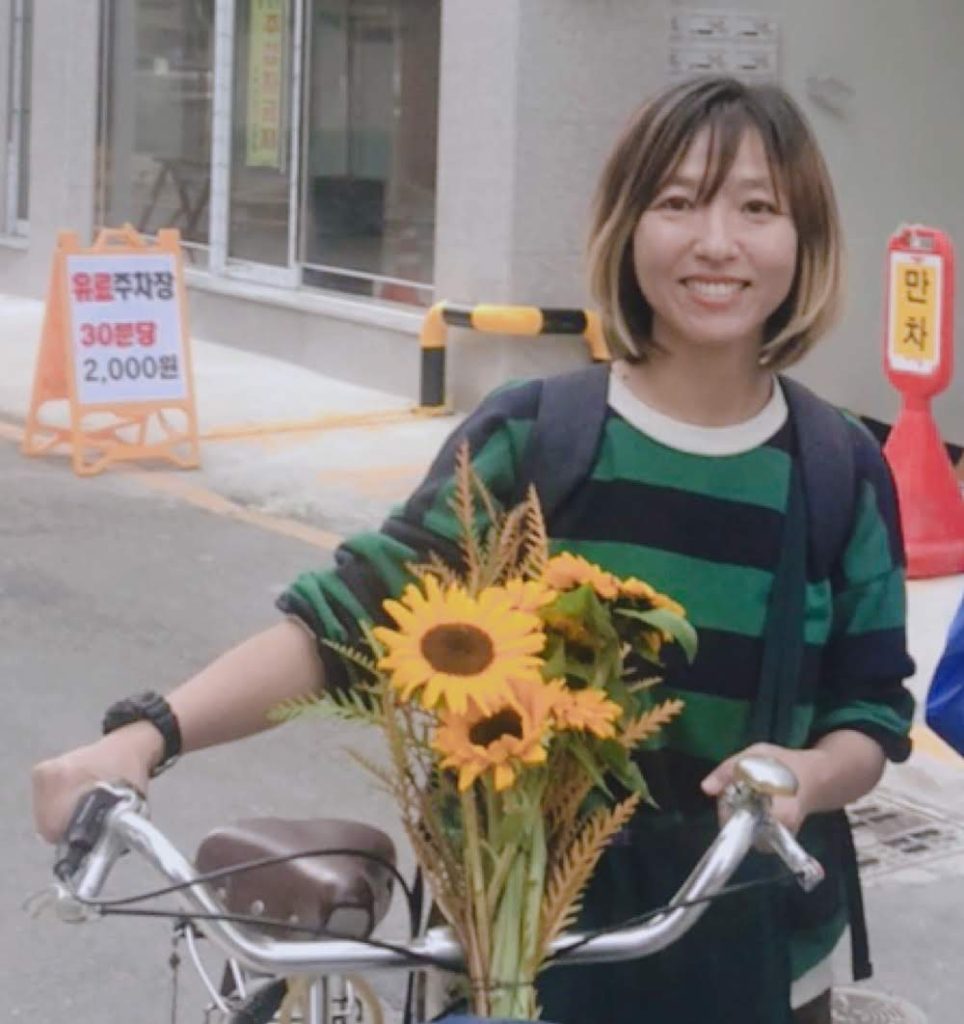
GN: Please describe exactly what this zero-waste concept is.
Lee Sehyoung: In 2013, Bea Johnson launched a book that was to become the bible for zero-waste devotees. It also introduced the Five Rs of zero-waste living:
Refuse: Say no to what you do not need.
Reduce: Let go of things that are no longer of use by donating or selling them. This also means only focusing on necessary purchases.
Reuse: Switch out disposable items for reusable and permanent alternatives.
Recycle: The process of collecting and processing materials that would otherwise be thrown away as trash and turning them into new products. We have been made to believe that recycling is the go-to solution for waste reduction. In fact, it is number four on the list behind refuse, reduce, and reuse.
Rot: Compost your own household waste or take part in a composting program for organic waste
In my own life, I have always wondered what we could do in the face of so many environmental issues and if we could live without disposables. My main goal was to promote the concept of zero waste. I wanted to run a pop-up store and let Gwangju residents know that recycling is not the only way to solve environmental problems. There are better ways such as reducing the use of plastic. For me, I personally like to reuse items. Zero-waste initiatives had already been implemented in Ulsan, Suncheon, and Seoul, and shops were being created.
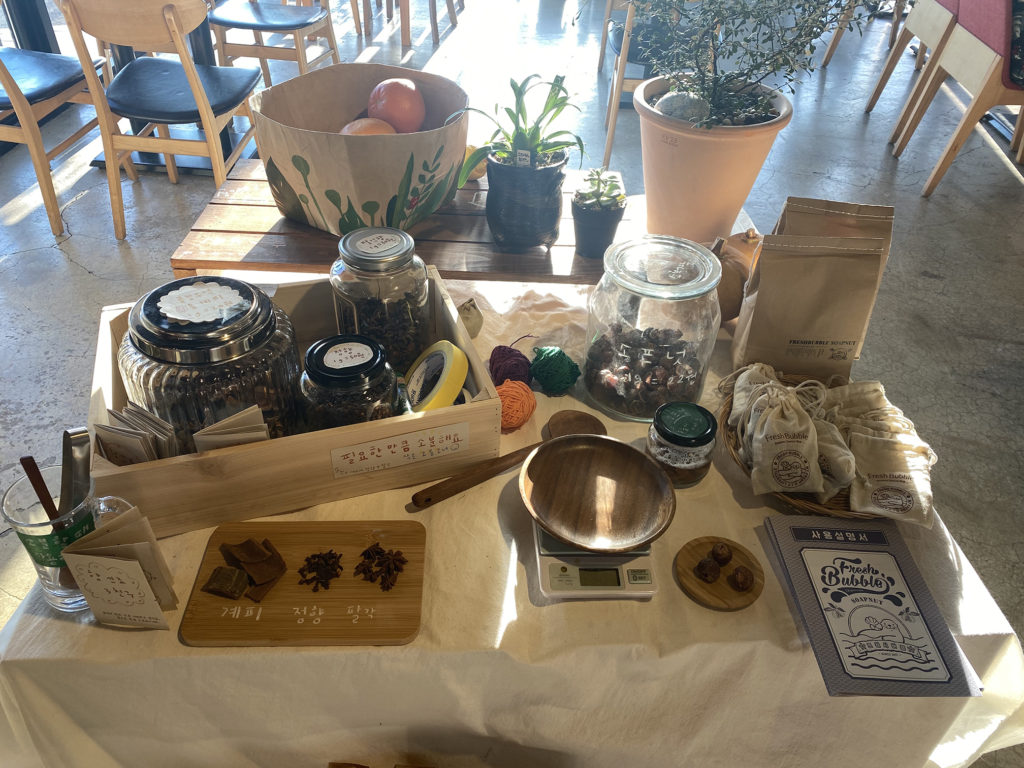
GN: It is not easy for a person to change long-entrenched habits. How willing do you think people are to change their habits for a better environment?
Lee Sehyoung: I think people are willing to change. When I had the pop-up store (appropriately named “One Step Store”), I thought that if one hundred people could be convinced to change their plastic toothbrushes to bamboo ones, it would be a first step in making a change. Step by step we can all learn to make some changes in our lifestyles. I started with a small step, a pop-up store, but now it has become the name of a network. At the time, I was surprised to see that more people visited the store than I thought would, so I felt that many people were already interested in the concept. We made a campaign to use reusable shopping bags instead of plastic bags at the Songjeong Five-Day Market. Glass bottles were gathered for reuse because recycling requires more energy and were mainly used for people to refill with dishwashing detergent (that we offer for free) and products were made with shoelaces. At that time, over two thousand people came, including foreigners, from various areas in Suncheon, Goheung, Naju, and Jangseong. Among them about two hundred participated in donating items such as milk cartons, shopping bags, etc. There were a lot of people who wanted to contribute something to this community.
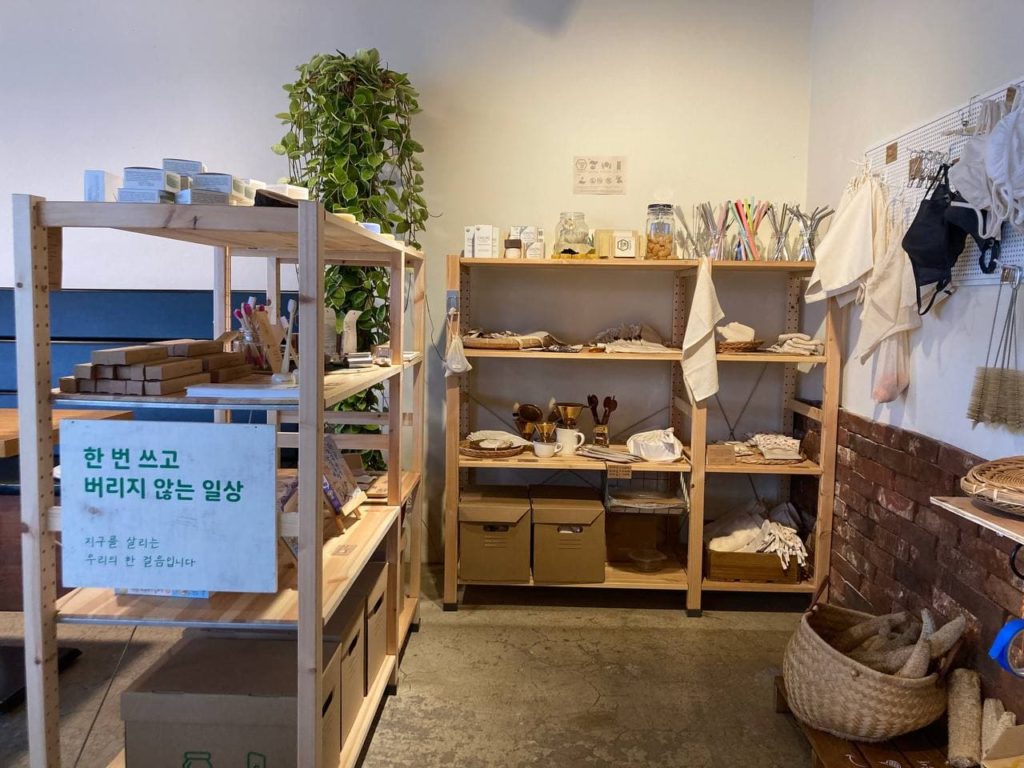
GN: Please tell us more about the zero-waste shop.
Lee Sehyoung: As I said, I started in 2017 with the community café, then ran some pop-up stores in 2020, and then I decided to have zero-waste store within the café place, which was officially opened in January 2021 at Igong Space (이로운 공간). The space now has multiple functions. It is a place that combines a café area, a zero-waste shop, and the “Community Reuse and Recycle Project” (우리동네 회수센터).
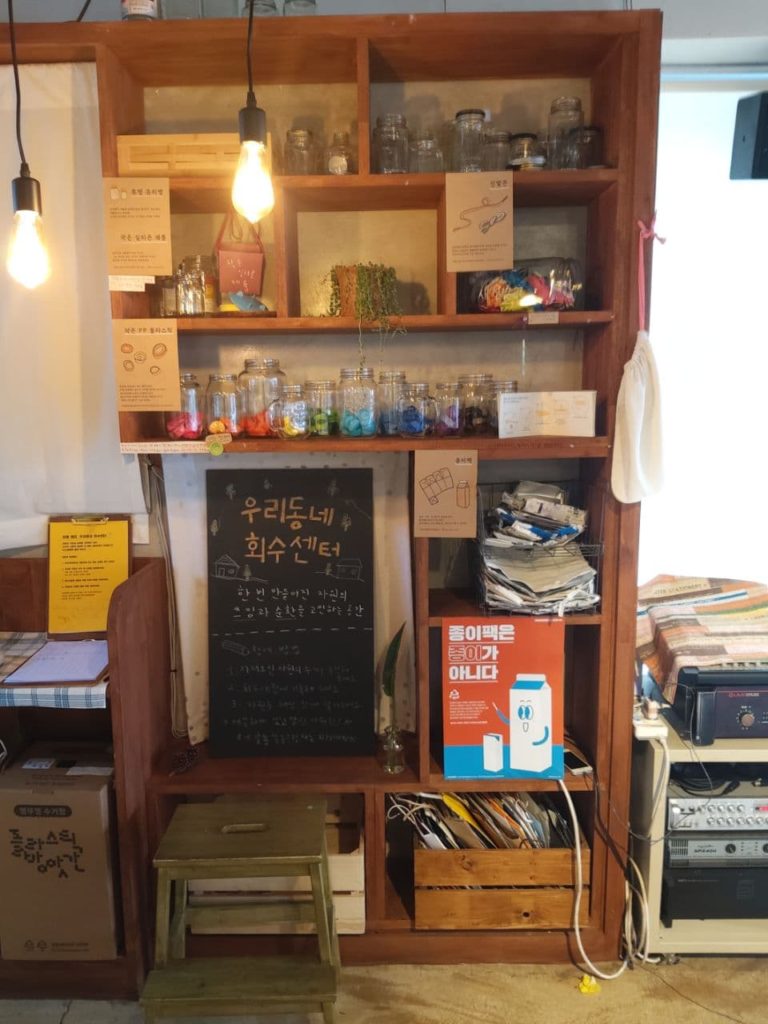
GN: What does the Igong Space shop offer to its customers and how did you find the suppliers?
Lee Sehyoung: Besides coffee and drinks that a coffee shop usually offers, we have selected the items that were best sellers last year when we ran the pop-up store. Our main care products are now soap nuts, bamboo toothbrushes, soap, shampoo, conditioner bars, and plastic-free toothpaste. All products are selected for plastic free or less waste, or zero waste. We are trying to have local items as well such as straws, handmade pouches for cutlery, and straws and handkerchiefs.
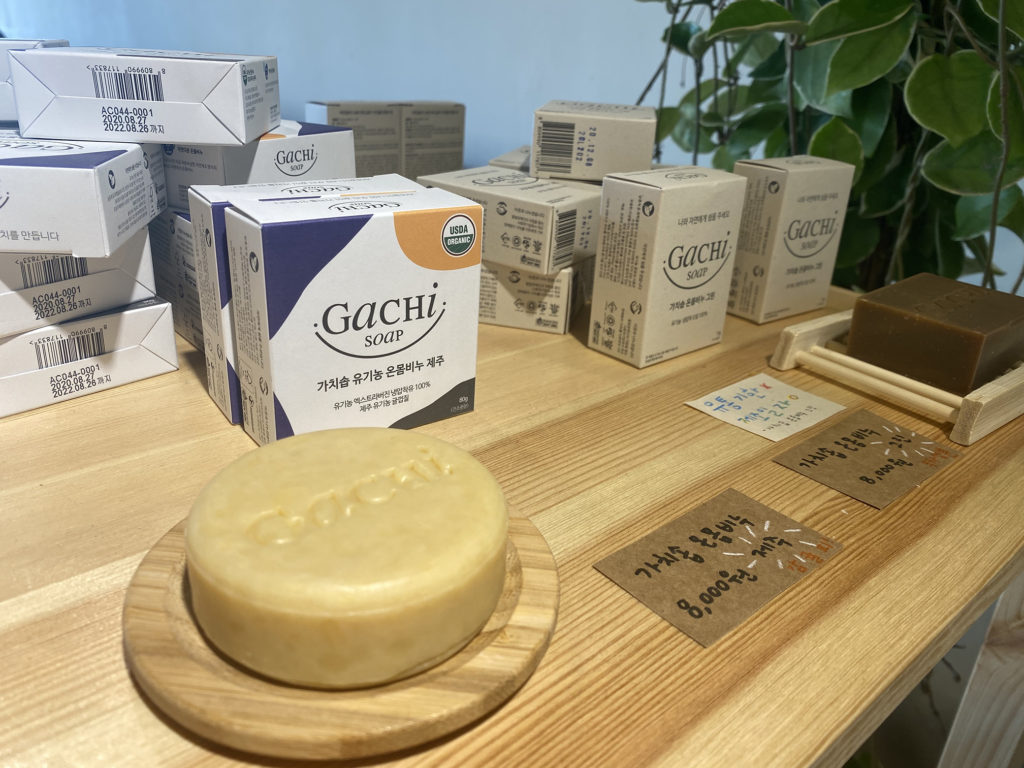
We sell other reusable products such as cloths coated with beeswax that can be used to cover leftovers, cups, or bowls. Because they change shape with the temperature from body contact, they can be used in various situations, with the usage period lasting as long as six months. We also sell stainless steel and silicone straws. The open straws made of silicone are especially convenient to wash. We also have different cloth products for sale such as mesh produce bags, cutlery bags, handkerchiefs, and even tea bags. Many people do not know that regular tea bags contain a lot of microplastics and are not safe. In addition, we have loofa scrubbers grown locally in Hwasun. The store is also used as a place to inform and promote various activities related to the environment. We are also giving away kitchen detergent for free for anyone to take home in a glass bottle.
As for suppliers, we collaborate with Donggubat (동구밭) for shampoo and conditioner bars. Donggubat is already a famous company that supplies a lot of environmental protection products and is also working with people with disabilities creating added value to the community.
A plastic-free example is the tablet toothpaste. The difference between tablet toothpaste and regular tube toothpaste is that there is no plastic left after use. Also, the dish-soap bar (bar-shaped soap detergent used for washing dishes) does not produce garbage that goes into plastic bins. Ingredients used for making some of the soap, shampoo, and conditioner bars are certified green.
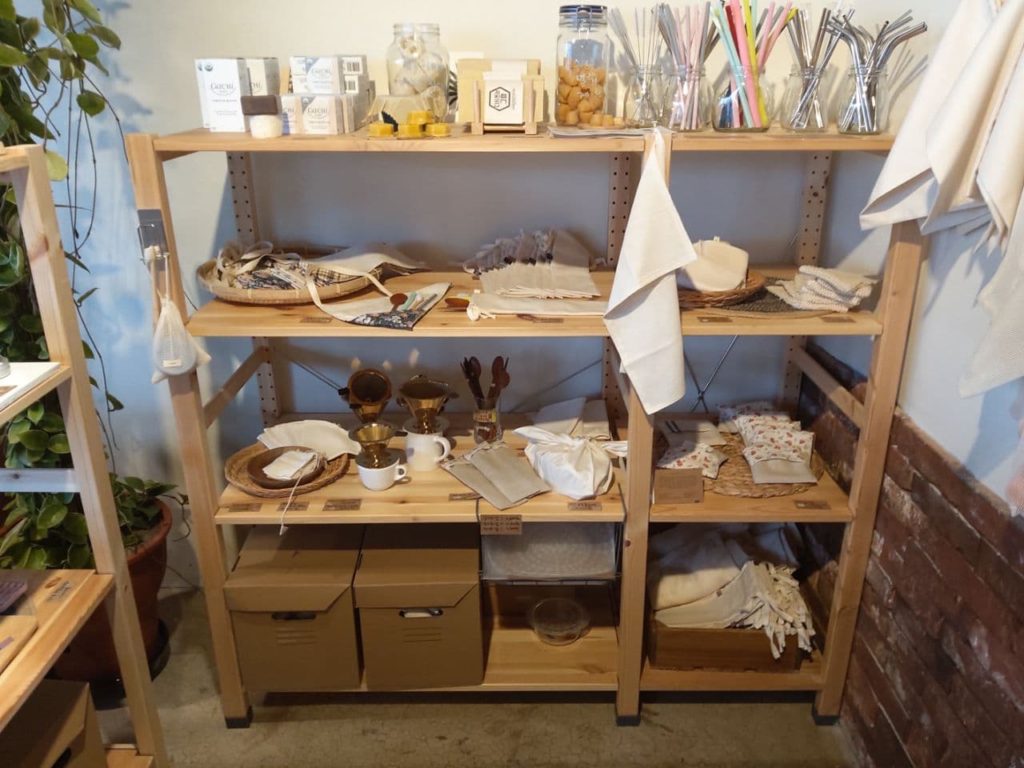
GN: Please tell us about the milk carton recycling initiative known as the “Cafe Latte Club.” How did it start, what is its purpose, and how have people responded to it?
Lee Sehyoung: I heard about such an institutive for the first time in 2019. Until then, I had washed used milk cartons and put them together with the paper disposables for recycling. I was shocked to find out that it was all in vain. I know that many people think that milk cartons are paper. But they actually have a different classification (Paper Pack / 종이팩류), and if discarded together with paper, they cannot be recycled at all. The milk cartons are coated with polyethylene that needs to be peeled off. If they are put together with paper, they cannot be completely melted and so cannot be recycled, not to mention that they are full of impurities.
Since 2015, Gwangju City has implemented an initiative consisting of giving away toilet paper rolls: 2 rolls of toilet paper for 1 kg of milk cartons (= 35 cartons of 1,000 ml). Now all city offices at the dong level have implemented the project so anyone can take these milk cartons to the closest neighborhood office and receive toilet paper in exchange.
At the time, it was not easy to gather 35 pieces at home, so I started a campaign with cafés that used a lot of milk. A structure was created in which the residents collected milk cartons at cafés, changed them at their neighborhood office and donated the toilet rolls to the neighborhood. In 2019, we invited some cafés to participate. Over about five weeks, 4,000 milk cartons were collected and exchanged for 120 toilet paper rolls, which were donated to local children’s centers along with environmental education. And, from last year, we created a community to spread the initiative around Gwangju.
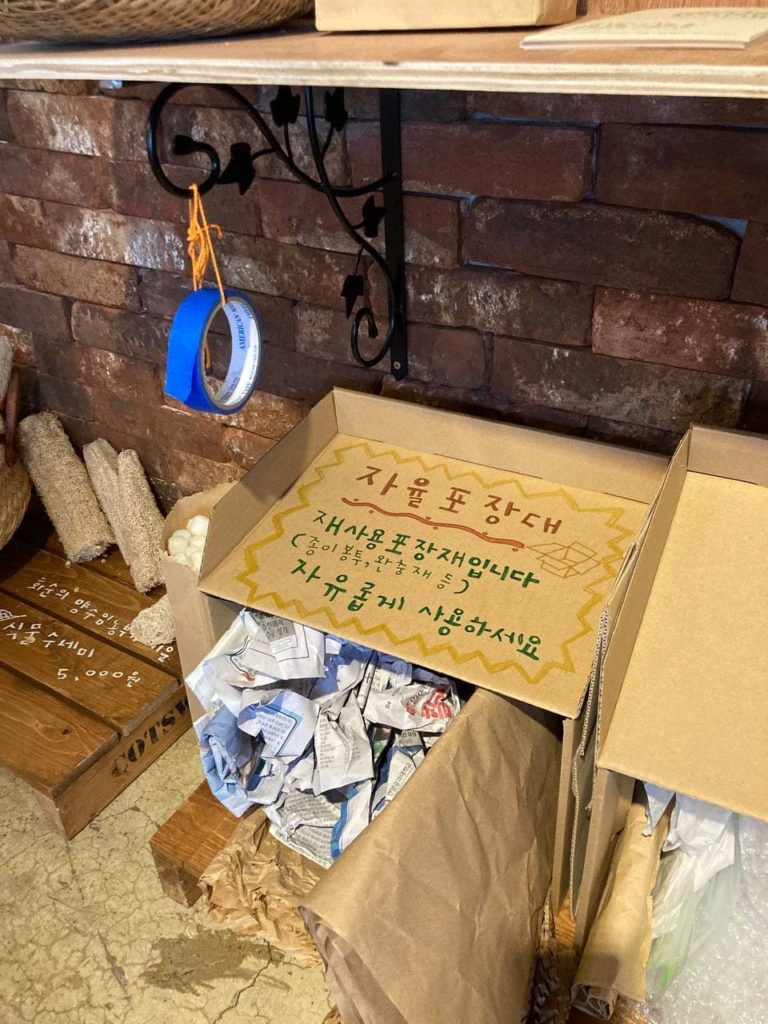
Currently, there are a lot of places where people collect these milk cartons, including coffee shops. For example, more than 100 cafes and bakeries in Gwangju are currently disposing of milk cartons separately. It is not difficult, so it seems like a lot of people are implementing it. This year, we are going to track the changes in the milk carton initiative and map the places where people can dispose the milk carton separately. I know that the Gwangju International Center has always been operating in accordance with the changing trends of the times and cares about the environment. I hope that such a movement will be actively carried out within the center.
(Since conducting this interview, the GIC has started a “Caffe Latte Club” initiative and is now collecting milk cartons. — Melline)
GN: Can you tell us more about the Community Reuse and Recycle Project?
Lee Sehyoung: Of course. The “Community Reuse and Recycle Project” is a campaign we currently have in progress. As I said before, I do not think recycling is the best way to tackle the garbage problem. Recycling is the lowest level. Before recycling, we should think about how to collect resources and reuse them. For example, small plastic items (such as juice bottle caps) fall out in the recycling process. The reason is that the conveyor belt in the recycling sorting center is so fast that workers give up on trying to sort the small pieces. So, they just get thrown away. But if one collects these items separately, they can be converted into another product. Glass is also recycled, but because it takes a lot of energy, we prefer to reuse it. At the entrance of the coffee shop, there is a space for collecting milk cartons. People can just donate their cartons there. We also offer free kitchen detergent.
Until February, we could offer a take-out option for our beverages only in single-use paper cups. But, to reduce the waste, we have implemented the “bottle club” campaign — lending tumblers-to-go to our customers.
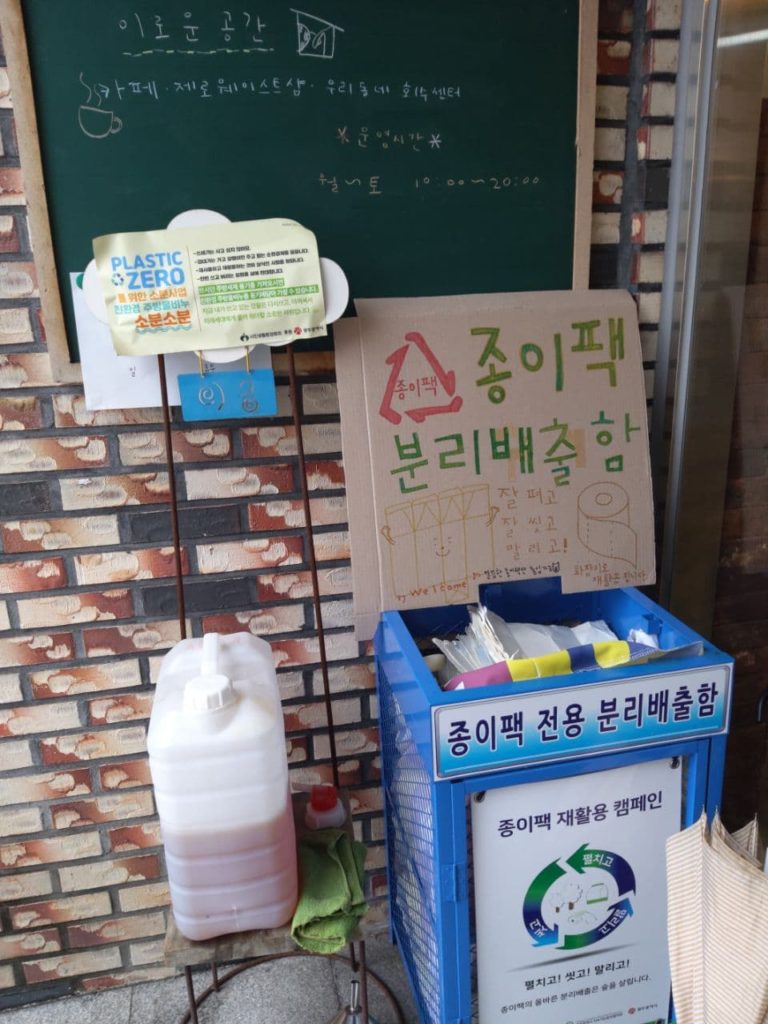
GN: What future plans do you have for the zero-waste shop?
Lee Sehyoung: I am thinking about ways to continue supplying the products inside this store in smaller quantities. They are usually purchased in bulk, but I am thinking about making sure that people can buy only the quantity they want.
I am also working on seasonal collaboration projects with local farmers. One of them is the “Market for Starting Farmers.” To support farmers who have just started small-scale farming, we are also thinking about opening various pop-ups with seasonal crops such as tomatoes.
GN: What kind of impact do you think this initiative will have on Gwangju’s residents?
Lee Sehyoung: I hope it will raise awareness about these problems and make some changes in the common mentality. As you can see, our store does not use plastic straws. In the past, there were many customers who were uncomfortable because they did not have plastic straws, but I think the fact that more and more people recognize and sympathize with environmental problems is the beginning of change. One item or method cannot make all the changes required, but I still think of it as a necessary factor to make changes. As I said, changes should be made step by step.
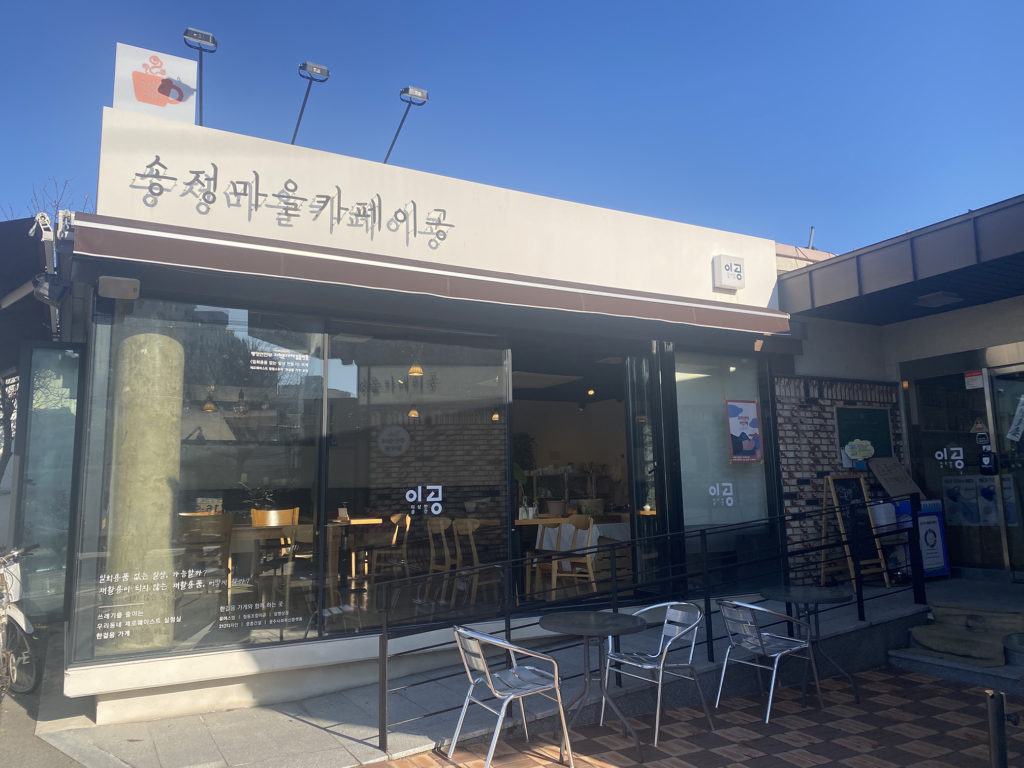
There are people who come here just for a drink with no knowledge of the zero-waste concept. But then they start asking about the products on the shelves. There are many people who make purchases. And I have the expectation that they will think about what they have bought more than once while using the products. Even if it does not actually lead to a purchase, I think there is a big difference between knowing and not knowing about the existence of these products. There are also people who want to live a waste-free life but do not know how to start, and they ask us for advice.
GN: I admire the work you are doing towards a waste-free society. Thank you very much for your time. Indeed, change starts with us. Together we can make a difference.
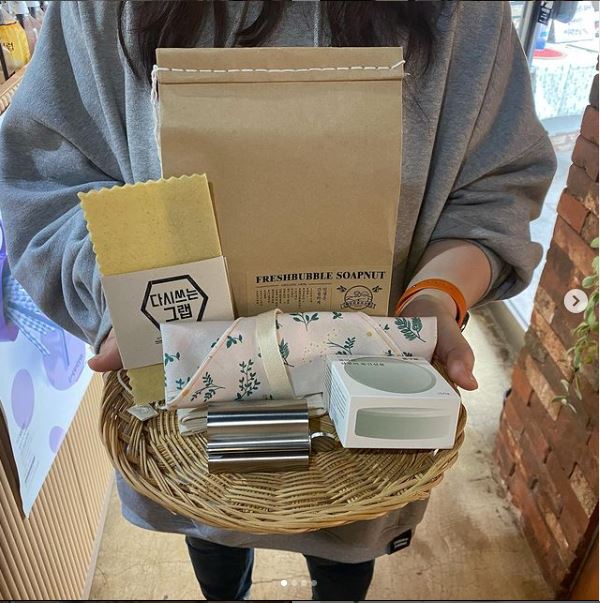
IGONG SPACE (이로운공간 이공)
Address: 257-1 Songdo-ro, Gwangsan-gu, Gwangju 광주 광산구 송도로 257-1
Operating Hours: 10:00 a.m. – 8:00 p.m., Monday–Saturday
Instagram: @cafe20_2roun0gan
The Interviewer
Melline Galani is a Romanian enthusiast, born and raised in the capital city of Bucharest, who is currently living in Gwangju. She likes new challenges, learning interesting things, and is incurably optimistic. She is always in search of natural and organic products from local producers. Instagram: @melligalanis







